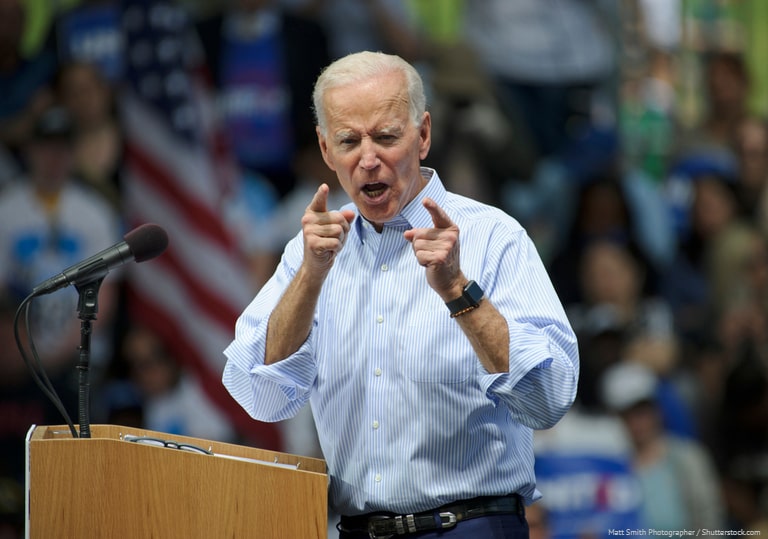By Tatyana Monnay, Center For Responsive Politics
Former Vice President Joe Biden sits at the top of the pack with more Wall Street cash than any other candidate in the presidential field. With other moderate candidates out of the race, Biden could get even more money from the deep-pocketed securities and investment industry.
So far, the industry contributed a total of $4.4 million to Biden’s campaign committee and closely-tied super PAC that supports his third presidential run.
After securing a big win in South Carolina and pending a strong Super Tuesday performance, Wall Street donors told Reuters they would be ready to fully support Biden. The industry invested over $15.3 million so far in the 2020 presidential election, keeping in line with its past behavior of pouring big money into elections.
Unsurprisingly, Sens. Elizabeth Warren (D-Mass.) and Bernie Sanders (I-Vt.) received the least from the industry compared to their competitors. Warren’s campaign committee received around $384,000 while Sanders got nearly $270,000. The two progressive candidates, especially Warren, have scared off Wall Street with their plans to increase regulations on big banks should they move into the White House next January.
Multiple Wall Street investors poured big money into Unite the Country, the pro-Biden super PAC, totaling more than $2.8 million.
Blum Capital Partners chairman and husband of Sen. Dianne Feinstein (D-Calif.) Richard Blum gave $1 million to Unite the Country. Another Wall Street investor, Reid Hoffman of Greylock Partners gave $500,000. Founder of the Chicago-based investment firm Wicklow Capital Daniel Tierney and president of the New York-based investment firm Trian Partners each gave the super PAC $100,000.
Before ending her presidential bid and endorsing Biden, Sen. Amy Klobuchar (D-Minn.) received over $814,000 in contributions from Wall Street operatives, making it one of the top industries that poured money into her presidential run. Wells Fargo employees gave nearly $50,000 to Klobuchar’s camp directly.
Employees of big banks gave over a quarter of a million dollars combined to Biden’s campaign. Wells Fargo employees gave around $80,000. Affiliates of Morgan Stanley and JPMorgan Chase & Co gave nearly $100,000 and close to $75,000, respectively.
The financial services firm BGC Partners’ employees gave more than $152,000 to Biden’s campaign committee. CEO Barry Gosin of Newmark Knight Frank, a BGC Partners subsidiary based in London, also poured $100,000 into Unite the Country.
During the height of former South Bend, Ind., Mayor Pete Buttigieg’s campaign, his support from Wall Street donors was often criticized by candidates such as Warren and Sanders, who pride themselves on their grassroots fundraising initiatives. Their supporters gave Buttigieg the nickname “Wall Street Pete.”
Before bowing out of the presidential race and endorsing Biden, Buttigieg received over $1.6 million in Wall Street cash. Warren and Sanders singled out Buttigieg in their attacks for hosting private events for deep-pocketed donors during the presidential debate in New Hampshire last month.
“If we want to change America, you’re not going to do it by selecting candidates who are going out to rich people’s homes, begging for money,” Sanders said.
Warren chimed in with a similar point later on.
“The way we build a democracy going forward is not billionaires reaching in their own pockets or people sucking up to billionaires,” Warren said.
Critics and her fellow competitors took jabs at Warren in the past on her changed position on support from wealthy elites and super PACs. A super PAC called Persist PAC spent $14.8 backing Warren, mostly in Super Tuesday states, without voluntarily disclosing its big-money donors before voters went to the polls.
The securities and investment industry is also bankrolling President Donald Trump’s reelection bid. Trump’s campaign committee and outside groups received close to $2.2 million.
The industry consists largely of hedge funds and private investment firms. Overall, the industry gave more to Democrats than they did Republicans. In this cycle alone, Democrats and liberal outside groups received 58 percent of the industry’s political giving.
Wall Street donor influence in politics grew largely after the landmark 2010 Citizens United ruling. As the year continues and there are fewer candidates left standing, Wall Street is expected to pour more money into the presidential election.
Tatyana Monnay is a Mid-Missouri based multimedia journalist. This piece originally appeared in the Center For Responsive Politics/
Note: The views expressed in this article are the author/s, and not the position of Intellectual Dose, or iDose (its online publication). This article is republished from the Center for Responsive Politics with permission.



